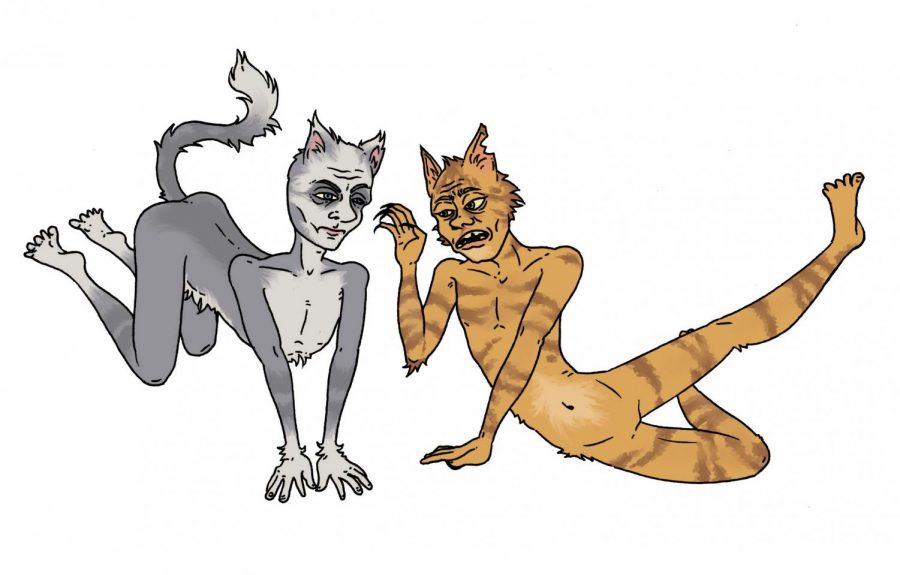Review | Cat(s) fight : A movie that transcends critique
January 8, 2020
This story is part of a two-part review of the movie “Cats.” Read part 2 here.
Forget the early dismissals, the bad press, the “21% Fresh.” Your Rotten Tomatoes score means nothing here in the Heaviside Layer. The genius of Tom Hooper’s “Cats” is that it is a film so insane, so unprecedented in every way, that it can be compared to nothing else in the world, and so cannot be judged as “bad” or “good.”
Could either of those words ever encompass the experience of watching Jason Derulo, transformed by the magic of computer-generated fur into a strange cat-human hybrid version of himself, lap suggestively at a stream of cream in a stylized neon “Milk Bar”? Or of witnessing Rebel Wilson unzip the fur that had appeared to be her own to reveal that it was only a coat covering up a sequined dance outfit? I think they could not. I think, perhaps, there are no words that could. All that can be said is that Jellicles can and Jellicles do. Period.
The Andrew Lloyd Webber musical Hooper’s film adapts has always been a bizarre creature of the ’80s — music and lyrics heavily inspired by a collection of T.S. Eliot poems, structured around an idea that’s referred to by some generous people as the show’s “plot.” The idea is that a community of Jellicle cats with names like Old Deuteronomy and Skimbleshanks the Railway Cat gathers annually to select a deserving representative to ascend to the Heaviside Layer and be reborn into another life.
The stage show was instantly and wildly popular. The Eliot poems are genuinely charming, a lot of the Webber tunes are genuinely catchy and the show’s most famous song — the 11 o’clock number “Memory,” with lyrics by Trevor Nunn — is pretty good! But also, they’re singing cats.
What I’m getting at here is that “Cats” feels like Hooper decided that he could just do whatever he wanted, so he did, and you should really see it. While other movie studios are using the film industry’s new advanced CGI capabilities to make impressive but already-forgettable animal projects, Hooper has used his “digital fur technology” to create something absolutely unforgettable. Disarming? Certainly. Ungodly? Perhaps. But there was not a single moment watching “Cats” where I was not wholly engaged by what was going on on-screen.
Actually, the points where “Cats” can be said to “fail” are the moments where it attempts to do things that normal movies do, like have a plot, or set up a villain (Idris Elba’s Macavity, the Mystery Cat). Macavity has a scheme to scam his way into becoming the Jellicle choice, a scheme so dumb and poorly thought-out that you remember you’re watching a movie, and everything falls apart.
The movie would be better if it didn’t have this subplot and its weak resolution. But it doesn’t really matter. This is all in the background. For most of the movie, we’re coasting along through the Jellicle community with our audience surrogate cat, Victoria (Francesca Hayward), abandoned by her owner at the start of the film, as she meets various other cats who tell her their names and a few key personality traits through songs.
Hayward, a ballet dancer, is sweet as Victoria, and her excitement is contagious. And the other cats she meets along the way are often charming. Derulo as the Rum Tum Tugger has an incorrigible, weird sexual energy, and Ian McKellen’s performance as Gus, the Theatre Cat is truly emotionally affecting. The key to these performances is that none of the actors in “Cats” is embarrassed to be in “Cats.” They just seem to be having fun. There’s a sincerity to the whole movie that makes it endearing. No one involved seems to have meant to create the weirdest $100 million film of the decade. It just sort of happened.
And the wonderful thing about “Cats” is that when a character doesn’t work — even I couldn’t drum up more than a mild morbid fascination in James Corden’s Bustopher Jones, for instance — the audience only has to sit through about one musical number’s worth of screen time before they stop being the center of attention. The same goes for “Beautiful Ghosts,” the forgettable original track cowritten by Webber and Taylor Swift for Hayward’s character, which clocks in at just under three minutes long.
Even during its low points, “Cats” is so different from anything else that exists that — I can’t stress this enough — you will not be able to look away. You might hate it. You might love it. But you need to see it for yourself.



